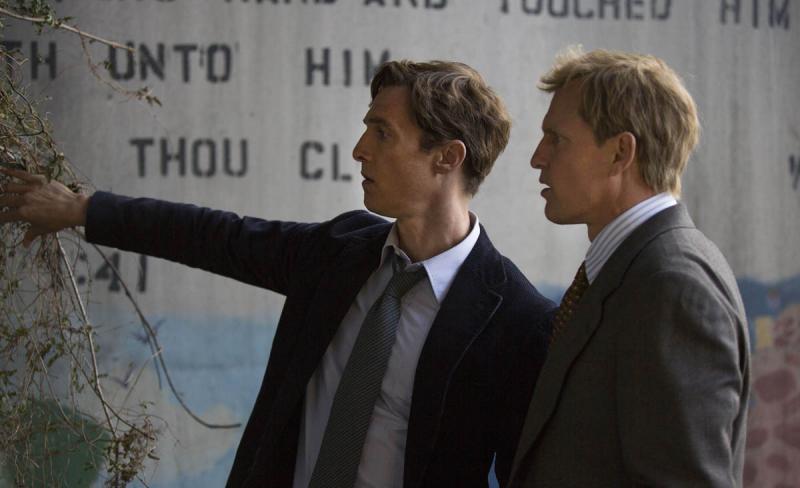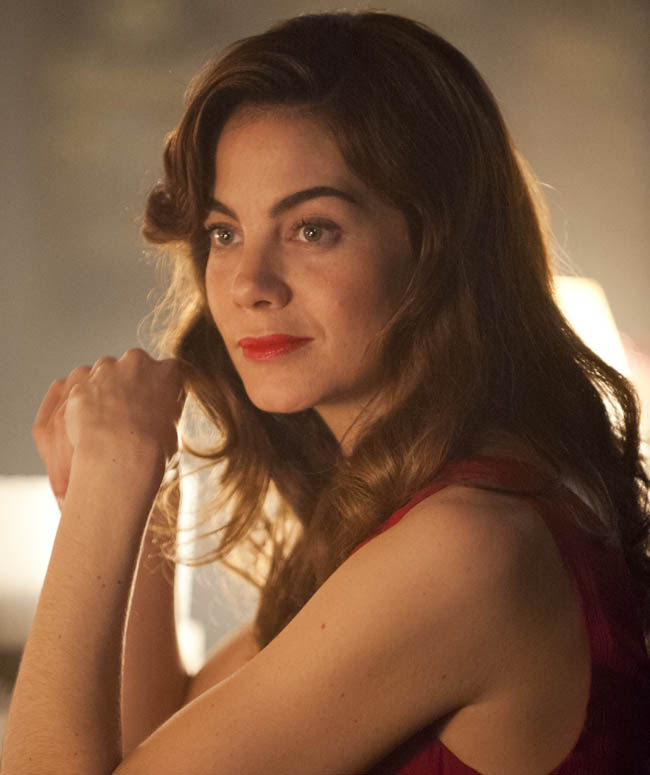True Detective, Sky Atlantic | reviews, news & interviews
True Detective, Sky Atlantic
True Detective, Sky Atlantic
Death on the bayou, with an added philosophical twist

You could boil down the content of this new HBO import to an info-bite that reads "two detectives hunt serial killer in Louisiana", but that wouldn't give you the faintest inkling of the pace, mood or texture of what's shaping up as a remarkable chunk of television. You may find it a little slow, and the Deep South accents sometimes cry out for explanatory surtitles, but you're liable to find it seeping into your consciousness like a troubling dream you can't shake off.
Unusually for an American show, this eight-part series has been authored solely by its creator, Nic Pizzolatto, and is helmed throughout by director Cary Fukunaga. Pizzolatto is a former English professor whose first novel, Galveston, appeared in 2010, and True Detective is unmistakeably a writer-first operation, notwithstanding some outstanding cinematography. The search for the killer, or - who knows? - killers, is the immediate preoccupation of the twin protagonists, detectives Rust Cohle and Martin Hart. Beyond that, though, Pizzolatto delights in leaving out all the usual police procedural stuff whenever possible, in favour of spinning a mesmerising skein of psychology, philosophy, memory and guilt, all lightly dusted with a miasma of creeping despair.
 The creators get plenty of help from the Louisiana geography, with its marshy plains spattered with run-down shacks, dirt roads, truck stops, belching factories, dingy bars and rickety churches. Above all there's the pair of dynamite leads, Woody Harrelson as shoot-the-shit good-ole-boy Hart, and Matthew McConaughey as Cohle. The latter's astounding mid-career transformation (what they're calling his "McConnaissance") continues to gather pace before your eyes in McConaughey's portrayal of Cohle as a kind of clairvoyant mystic who treats homicide detection as a personal Grail quest.
The creators get plenty of help from the Louisiana geography, with its marshy plains spattered with run-down shacks, dirt roads, truck stops, belching factories, dingy bars and rickety churches. Above all there's the pair of dynamite leads, Woody Harrelson as shoot-the-shit good-ole-boy Hart, and Matthew McConaughey as Cohle. The latter's astounding mid-career transformation (what they're calling his "McConnaissance") continues to gather pace before your eyes in McConaughey's portrayal of Cohle as a kind of clairvoyant mystic who treats homicide detection as a personal Grail quest.
In fact you get a double portion of McConaughey thanks to the show's split timeline. We ride with Hart and Cohle during their original 1995 investigation of a creepy ritualistic killing of a prostitute, then watch them being interviewed in 2012 by detectives investigating a new murder, reminiscent of the earlier case. While Harrelson's Hart is himself but older, the obsessively driven younger Cohle has aged into a tattered recluse, methodically drinking himself to death (pictured above).
Nonetheless, Pizzolatto has found ways to smuggle in the occasional wry smile, often in scenes where Hart is trying to fathom what's going on in Cohle's head as they're driving to their next appointment. Cohle, a Schopenhauer among crime-fighters, is given to soliloquies about the worthlessness of mankind or the dismalness of the bayou landscape ("It's all one ghetto, man - a giant gutter in outer space"). He adds: "In philosophical terms I'm what's called a pessimist. It means I'm bad at parties."
"You ain't great outside of parties either," Hart retorts.
 Sceptical colleagues have nicknamed Cohle "The Taxman", for his habit of carrying around a large ledger in which he writes copious case notes, and he sees persistence and accretion of detail as the keys to cracking a case which the police brass are characterising as having "an anti-Christian connotation". The atheistic Cohle, by contrast, is not duped by the killer's fondness for ghoulish Blair Witch-style symbolism, and has deduced that he's a "meta-psychotic".
Sceptical colleagues have nicknamed Cohle "The Taxman", for his habit of carrying around a large ledger in which he writes copious case notes, and he sees persistence and accretion of detail as the keys to cracking a case which the police brass are characterising as having "an anti-Christian connotation". The atheistic Cohle, by contrast, is not duped by the killer's fondness for ghoulish Blair Witch-style symbolism, and has deduced that he's a "meta-psychotic".
But of course it's the actions and choices, past and present, of the detectives that are being investigated as much as the crime itself. Cohle has been irreparably seared by the death of his young daughter and subsequent divorce, while we can sense that Hart's ostensibly model family (two photogenic kids and wife Maggie, played by Michelle Monaghan, pictured above) is a fragile structure being battered by fierce Dixie storms. A happy ending? I doubt it.
rating
Share this article
The future of Arts Journalism
You can stop theartsdesk.com closing!
We urgently need financing to survive. Our fundraising drive has thus far raised £49,000 but we need to reach £100,000 or we will be forced to close. Please contribute here: https://gofund.me/c3f6033d
And if you can forward this information to anyone who might assist, we’d be grateful.

Subscribe to theartsdesk.com
Thank you for continuing to read our work on theartsdesk.com. For unlimited access to every article in its entirety, including our archive of more than 15,000 pieces, we're asking for £5 per month or £40 per year. We feel it's a very good deal, and hope you do too.
To take a subscription now simply click here.
And if you're looking for that extra gift for a friend or family member, why not treat them to a theartsdesk.com gift subscription?
more TV
 Murder Before Evensong, Acorn TV review - death comes to the picturesque village of Champton
The Rev Richard Coles's sleuthing cleric hits the screen
Murder Before Evensong, Acorn TV review - death comes to the picturesque village of Champton
The Rev Richard Coles's sleuthing cleric hits the screen
 Black Rabbit, Netflix review - grime and punishment in New York City
Jude Law and Jason Bateman tread the thin line between love and hate
Black Rabbit, Netflix review - grime and punishment in New York City
Jude Law and Jason Bateman tread the thin line between love and hate
 The Hack, ITV review - plodding anatomy of twin UK scandals
Jack Thorne's skill can't disguise the bagginess of his double-headed material
The Hack, ITV review - plodding anatomy of twin UK scandals
Jack Thorne's skill can't disguise the bagginess of his double-headed material
 Slow Horses, Series 5, Apple TV+ review - terror, trauma and impeccable comic timing
Jackson Lamb's band of MI5 misfits continues to fascinate and amuse
Slow Horses, Series 5, Apple TV+ review - terror, trauma and impeccable comic timing
Jackson Lamb's band of MI5 misfits continues to fascinate and amuse
 Coldwater, ITV1 review - horror and black comedy in the Highlands
Superb cast lights up David Ireland's cunning thriller
Coldwater, ITV1 review - horror and black comedy in the Highlands
Superb cast lights up David Ireland's cunning thriller
 Blu-ray: The Sweeney - Series One
Influential and entertaining 1970s police drama, handsomely restored
Blu-ray: The Sweeney - Series One
Influential and entertaining 1970s police drama, handsomely restored
 I Fought the Law, ITVX review - how an 800-year-old law was challenged and changed
Sheridan Smith's raw performance dominates ITV's new docudrama about injustice
I Fought the Law, ITVX review - how an 800-year-old law was challenged and changed
Sheridan Smith's raw performance dominates ITV's new docudrama about injustice
 The Paper, Sky Max review - a spinoff of the US Office worth waiting 20 years for
Perfectly judged recycling of the original's key elements, with a star turn at its heart
The Paper, Sky Max review - a spinoff of the US Office worth waiting 20 years for
Perfectly judged recycling of the original's key elements, with a star turn at its heart
 The Guest, BBC One review - be careful what you wish for
A terrific Eve Myles stars in addictive Welsh mystery
The Guest, BBC One review - be careful what you wish for
A terrific Eve Myles stars in addictive Welsh mystery
 theartsdesk Q&A: Suranne Jones on 'Hostage', power pants and politics
The star and producer talks about taking on the role of Prime Minister, wearing high heels and living in the public eye
theartsdesk Q&A: Suranne Jones on 'Hostage', power pants and politics
The star and producer talks about taking on the role of Prime Minister, wearing high heels and living in the public eye
 King & Conqueror, BBC One review - not many kicks in 1066
Turgid medieval drama leaves viewers in the dark
King & Conqueror, BBC One review - not many kicks in 1066
Turgid medieval drama leaves viewers in the dark
 Hostage, Netflix review - entente not-too-cordiale
Suranne Jones and Julie Delpy cross swords in confused political drama
Hostage, Netflix review - entente not-too-cordiale
Suranne Jones and Julie Delpy cross swords in confused political drama

Add comment